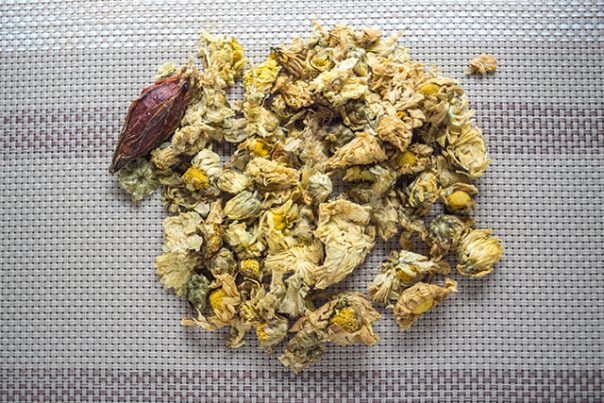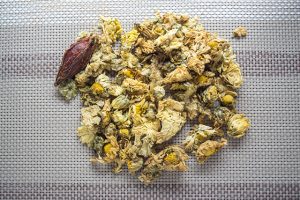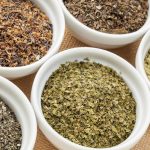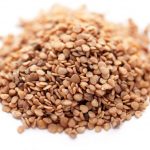
Chrysanthemum – sources, health benefits, nutrients, uses and constituents at NaturalPedia.com
Tuesday, June 27, 2017 by Jhoanna Robinson
http://www.naturalnewsherbs.com/2017-06-27-chrysanthemum-sources-health-benefits-nutrients-uses-and-constituents-at-naturalpedia-com.html

Chrysanthemum tea originated in China in the Song Dynasty about a thousand years ago but has since become a staple in tea parties all over the world. You know you are drinking chrysanthemum tea because you can detect the faint aroma of flowers, which is actually accurate, as flowers can be seen submerged at the bottom of your cup if you are indulging in this particular drink. Wolfberries or other herbs may also be present in your cup.
According to Dr. J.D. Yang, an expert in Chinese integrative medicine, chrysanthemum — whose scientific name is Chrysanthemum indicum — is described as something that provides mildly cold energy. Chinese or traditional medicine, unlike its Western counterpart, classifies herbs by their energetic properties rather than the chemicals that they possess.
List of known nutrients
- Beta-Carotene
- Choline
- Potassium
- Folate
- Niacin
- Riboflavin
- Vitamin A
- Vitamin C
Medicinal uses for chrysanthemum
Chrysanthemum is good for treating respiratory problems, high blood pressure, and hyperthyroidism. In effect, chrysanthemum lessens the risk of heart disease. It is also considered a powerful relaxant.
Chrysanthemum is rich in potassium, which is considered a vasolidator, or an agent which propagates the relaxation of smooth muscle cells within the vessel walls. This activity eases the tension in the large arteries and smaller arterioles, thereby contributing to a lowered blood pressure.
Chrysanthemum is a good source of folate (vitamin B9) which aids in cell development; specifically the formation of red blood cells, proper heart function, and reproductive health. The formation of white blood cells, on the other hand, is stimulated by vitamin C, another essential nutrient also found in chrysanthemum.
Coffee usually holds the reputation as that one beverage that can give you razor-sharp focus, intense levels of concentration, and an instant energy boost. Chrysanthemum tea provides all these, plus has the added factor of not having any caffeine, a psychoactive drug that can cause increased risks of heart attack and high blood pressure.
Chrysanthemum tea can be used to treat sore throats and excessive coughing. People who also take chrysanthemum teas over a long period of time attest to a reduction of their body heat and inflammation in their body. People with fever or flu are advised to ingest this beverage.
Chrysanthemum has a high beta-carotene content, which is further broken down to vitamin A, a nutrient that can serve as an antioxidant and repair damage cells in organ systems inside the body. Vitamin A also contributes to the reduction of signs of aging (such as wrinkles and blemishes) and good eyesight (it can protect you from the risks of contracting retinal neuropathy, macular degeneration, or even simple blurry vision).
Body systems supported by chrysanthemum
According to the ways of traditional Chinese medicine, chrysanthemum contains some energetic properties that contribute to the proper function of internal organs such as the liver, kidneys, lungs, and spleen. However, proponents of these claims have yet to provide evidence to back up their statements.
Due to high concentrations of vitamins A and C in chrysanthemum, drinking tea made from this plant can be good for the immune system.
Ways to enjoy chrysanthemum
To err on the side of caution, use chrysanthemum flowers or leaves that you are sure have been sprayed with pesticides, so that your chances of drinking insect-infested tea might be lessened. If you are pregnant or nursing, or are taking prescription medicines, ask your doctor for advice regarding chrysanthemum intake.
Take your pick from these awesome recipes for chrysanthemum.
Where to learn more
- Overheated this summer? Cool anger, anxiety, stress and more with chrysanthemum tea
- New Research shows powerful tumor-destroying effects of Chrysanthemum extracts
- Stop and Kill Cancer Cells: Chrysanthemums could Hold the Key, Chinese Scientists Find
- Aerial spraying to kill mosquitoes linked to 25% increase in autism, finds shock study by American Academy of Pediatrics
- 8 Ways to Purify Your Home Air Naturally
Summary
Chrysanthemum tea is good for treating respiratory problems.
It is mainly considered as a relaxant, but it can also provide a much-needed energy boost in certain cases.
Drinking chrysanthemum tea when you have a sore throat or a prolonged cough is a good way to get rid of these ailments.
Sources include:
Tagged Under: Tags: chrysanthemum






